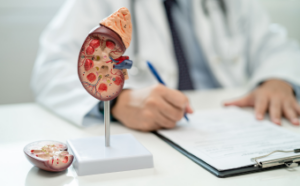Seferiana Day was diagnosed with Primary Membranous Nephropathy and Stage 1 Chronic Kidney Disease in February 2016. An otherwise active and healthy 30 year old, Seferiana consulted her doctor after noticing unusual swelling in her ankles. A series of tests ruled out Lupus, HIV, and other auto-immune illnesses, and three months after the initial swelling began, a kidney biopsy concluded her MN diagnosis.
Seferiana went from being an avid half marathoner, to being unable to walk comfortably due to severe swelling in her legs and abdomen. Within six months of her diagnosis, Seferiana gained 30 pounds of water weight, and was no longer able to comfortably run long-distance. On a good day, she would jog a mile or until the water filled her ankles and knees. She sought acupuncture and lymphatic massage to ease the swelling, with little success. She would pull on a pair of compression socks and rest with her legs propped up the wall for a temporary reprieve. She would attend events for work and professional networking, just to leave early because of the extreme swelling and pain in her legs and feet. While she tried to do the things she once loved, MN was hindering her daily life.
Seferiana shares her story to highlight the need to find a cure for MN, and she has hopes that remission is on the horizon.
While on Cyclosporine, Seferiana tested for the PLA2R antibody, which came back positive. After seeing no real improvement in protein loss, her nephrologist ordered Rituximab treatments in late 2017. Rituximab eventually brought her PLA2R levels down into an undetectable range, and her swelling went down significantly. On a minimal treatment plan of Losartan throughout the first year and a half of the pandemic, Seferiana’s protein levels crept up once again, and a new biopsy showed additional scarring and that her kidney disease had progressed to Stage 3.
Seferiana was then recommended cyclophosphamide as the next viable option, because she had never achieved remission with prior treatments. She declined the treatment because of the likely side effect of infertility. At 35, she desired to start a family, and could not imagine taking that risk. A recent round of Rituximab in October 2022 has brought Seferiana’s blood albumin levels into the green for the first time in seven years, and her protein loss is less severe and slowly declining. Seferiana’s disease is not outwardly obvious and swelling is less frequent, but the mental health and internal physical effects of the past seven years are very real. Seferiana shares her story to highlight the need to find a cure for MN, and she has hopes that remission is on the horizon.

